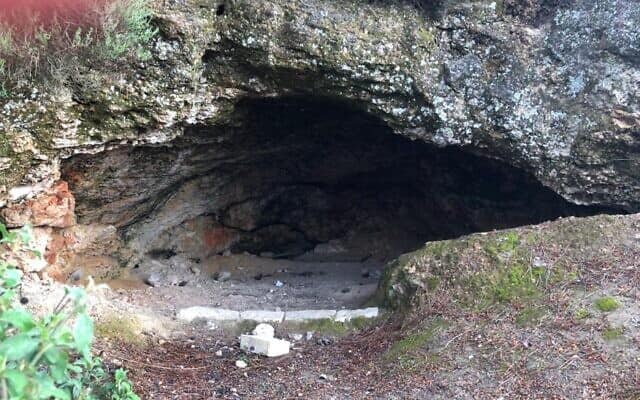The Cave Man

מתוך "The Brutal Death of the Cavema" מאת שלום ירושלמי
In a cave in the forest near Mount Herzl, near a tree planted by Ben-Gurion and communication channels from the days of the Turks, lived for 17 years a man named Jacob Weissblom.
הסדר במערה היה מופתי. מימין קופסאות השימורים, הכוסות הריקות, הצלחות והסכו"ם וכלי הרחצה, משמאל הספרים והעיתונים הישנים באנגלית, שאותם היה קורא עם זכוכית מגדלת שמצא ליד הר הרצל. גם סדר היום שלו היה מוקפד, אם כי חלקים ממנו נסתרים מאיתנו עד היום.
כיצד היה משיג את לחמו? על העץ הסמוך למערה תלה יעקב קופסת פח ועליה כתב "צדקה". אנשים שעברו בסמוך נהגו לתרום כסף. לפעמים היה יעקב מקבץ נדבות. את הכסף המועט שאסף היה מחלק לאביונים שפגש בדרך. זו הייתה גמילות החסדים שלו, מצווה שייחס לה חשיבות רבה.
Jacob was born in 1937 in New York and lived in the Jerusalem cave for 17 years. 82 years old when he died, reached his cave in the late 90s. His father was a traveling cantor, who took him on his journeys between the communities in New York, and Jacob never forgot those chants and tunes, and occasionally marveled at them in his last years.
פעם הוא סיפר שאמו החרדה לקחה אותו לפגישה והתייעצות אצל הרבי מלובביץ' בכבודו ובעצמו, בגלל שסירב ללכת ללמוד בישיבה. הרבי הדהים את שניהם. "יעקב לא צריך ללמוד בישיבה. העיקר שיהיה בן אדם טוב", הוא פסק בקצרה, ושלח אותם בחזרה לביתם בברוקלין.
יעקב היה איש משכיל ורחב אופקים. הוא למד בלשנות בסיטי קולג' בניו יורק והתמחה באוניברסיטת פרינסטון בניו ג'רזי ובברקלי בקליפורניה. בשנות ה-60 התגרש ועזב את משפחתו בארצות הברית ועלה לישראל. בתחילה חי בחיפה ולימד בלשנות באוניברסיטת חיפה, שם הכיר את אשתו השנייה. "היינו נשואים במשך שלוש שנים, ולא נולדו לנו ילדים. היא הייתה לי אישה נפלאה. בת של שופט. הייתה בינינו אהבה נהדרת, אהבה קדושה", כך סיפר. לימים חזר בתשובה על פי דרכו ובני הזוג עברו להתגורר בירושלים, עד שנטש שוב.
"החיים בעיר הם בלתי נסבלים", הוא התלונן פעם. "גרנו בדירה בבית משותף ברעש ובצפיפות עם שכנים שלא נתנו לי מנוח". יעקב קם ועזב ונדד ברחובות הערים וביערות עד שגילה, כזכור, את הפתח למערה שהפכה לביתו.
יעקב היה איש מנומס וסימפטי. הוא שלט היטב בשפות רבות, כיאה לפרופסור לבלשנות, ביניהן עברית, אנגלית, יידיש וספרדית. בעזרת ידע פנומנלי וכושר מחשבה וביטוי יוצאי דופן הוא פירק סוגיות שונות בתחומי ההגות והפילוסופיה ודן בהן בצורה מעוררת השתאות. הוא הכיר היטב את כתבי הרמב"ם, עמנואל קאנט וברוך שפינוזה, אבל הפייבוריט שלו היה הפילוסוף הגרמני ארתור שופנהאואר, "הפילוסוף של הפסימיות".
Jacob thought that this world was hell incarnate. Man's behavior towards nature and the relationships between people convinced him that this world is hopeless.
הוא הרבה לצטט את הפסוקים בתנ"ך שביטאו את המיאוס של אלוהים מהעולם שברא. יעקב התנהג ברגעים האלה כמו נביא זעם עם עיניים יוקדות, הרים את הקול, ננעל על הכעס שלו ולא נתן הרבה תקווה.
ועם זאת, יעקב היה יהודי מאמין שהקפיד על מצוות הדת, ובעיקר שמר על השבת. בימיו במערה הוא נהג ללכת בימי חמישי למקווה בהר נוף. במערה הוא היה מכין בגדים לבנים ומגוהצים ככל שיכל, שאותם היה לובש בחרדת קודש עם כניסת השבת והדלקת הנרות. יעקב היה מלווה את השבת שעות רבות אחרי צאתה. "זה מלווה המלכה שלי", סיפר.
(Anecdote authored by: דניאל)
(Number of views: 98)
